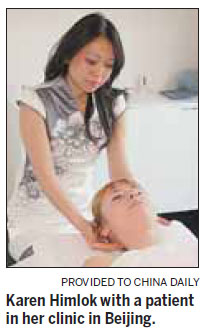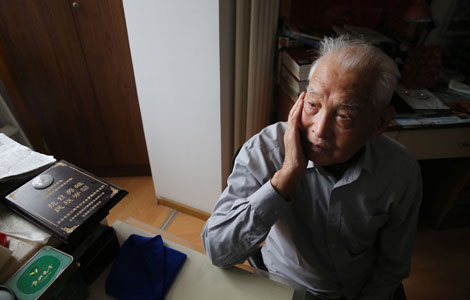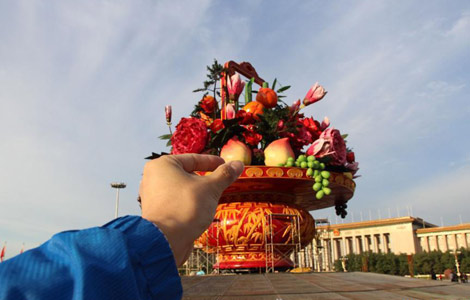Patients' health in her hands
Updated: 2013-09-24 06:41
By Mike Peters (China Daily)
|
|||||||||
Her hands have been all about traditional Chinese medicine for as long as she can remember. In her current practice based in Beijing, South Africa native Karen Himlok is still surprised by Western patients who struggle with the concept of qi.
"There is nothing magical about it," she says. "It's the vital force, the life force, the energy that keeps us going.
"How else do you explain that you're alive - that you move?" she asks rhetorically. "Are you battery-operated? Do you plug yourself in at night to get energy?"
For Himlok, who integrates the traditional medical system of her ancestors in Guangdong with the diagnostic tools of Western medicine, qi is as fundamental as the body's immune system.
Her holistic sense of human health began in her childhood, she says, when TCM informed the food choices. "So we always had healthy, delicious meals when I was growing up."

Himlok got really interested in how the body works, she says, and after high school, she studied homeopathy and medical sciences at medical universities in Johannesburg and Natal - starting with a year of anatomy with cadavers.
After that test of her commitment and nerve, she dove into courses in pathology, physiology, medical diagnostics and, later, nutrition and pharmacy. Her dissertation brought all of those disciplines together - she's proudly saved citations of her work from medical journals and magazines - and went on to apply her base of knowledge to a research project with Cambridge University and the National Health Service in Britain. The focus: special needs practice and complementary therapies for autism and epilepsy.
"I found myself amazed - and a bit annoyed - by situations where patients are told they are just not going to get better," she says. "I find that very limiting, to take away that person's power."
Having grown up in South Africa with other Cantonese-speaking families, she came to China for the first time in 1999 with her family, looking for ancestral roots in Zhongshan. Besides getting a taste of the mother culture, she was fascinated by TCM's large-scale practice in China, particularly therapies like acupuncture - even in general hospitals doing traditional Western medicine.
So she moved here a few years later, eager to study Chinese traditional medicine "at the source". The Cantonese-speaking therapist also wanted to learn Mandarin - at one point vowing she would never leave China until she was fluent - but learning everything she can about TCM has taken most of her time.
Himlok says her approach to transformational healing combines qigong, meditation, cranial psychological work, and neuro-muscular release. Those are big concepts for some to get their heads around, but the soft-spoken specialist says the applications directly touch everyday life.
"My specialties are detox, weight loss, and anti-aging," she says of a practice that has recently included consulting residencies in the Philippines, London and Spain. "Holistic medicine is safe, natural, preventative health care, and we use non-invasive therapies to stimulate the immune system and improve health and well-being."
Sometimes clients come because they have a specific ailment, while some come because they are "just not feeling well", and someone told them "Karen can help".
"Those are not cases of disease but of 'dis-ease'," she says, "when people are not in tune with their self or their body or their emotional state."
She cites a recent client for whom she developed a customized holistic treatment that included acupoint meridian therapy, neuromuscular release, cranial qigong theta healing, nutrition, and lifestyle changes.
"Everybody is up against time constraints," she says, "and that often means we only focus on the physical. But our mental and emotional levels are equally important," she says. "All of that makes up the person."
For many expats that come to her for treatment, she says, there is a slow but steady erosion of self-awareness after arriving in the new culture that is China.

"It's quite easy for people to get negative, depressed - overwhelmed by the foreign-ness and language barrier," she says. "Often only the spouse may be allowed to work, and then there is the process of settling children in school, and building your own personal network.
"In their home country, they were more occupied, had a better job, more friends, and almost without knowing it they start to spiral down," she says.
"You can't support that person with just medicines," she says. "It takes emotional counseling, too, to help people launch positive thought processes so they can start being creative and being passionate about life again."
Part of her role, she says, is to ask, "What would you like to do? And why haven't you done it yet?"
"Sometimes people don't really know, they haven't taken time to ask themselves," she says. "Start a business? A website? Learn something new?
"It's not all about bodywork. The mental, physical and psychological have to be in tandem. If not, we have to manipulate a shift so that they are. When you understand that you need an even flow of these energies, you understand qi and you can use it to its full potential."
Michaelpeters@chinadaily.com.cn
(China Daily 09/24/2013 page18)

 Victoria Beckham S/S 2014 presented during NYFW
Victoria Beckham S/S 2014 presented during NYFW
 'Despicable' minions upset Depp's 'Lone Ranger' at box office
'Despicable' minions upset Depp's 'Lone Ranger' at box office
 'Taken 2' grabs movie box office crown
'Taken 2' grabs movie box office crown
 Rihanna's 'Diamonds' tops UK pop chart
Rihanna's 'Diamonds' tops UK pop chart
 Fans get look at vintage Rolling Stones
Fans get look at vintage Rolling Stones
 Celebrities attend Power of Women event
Celebrities attend Power of Women event
 Ang Lee breaks 'every rule' to make unlikely new Life of Pi film
Ang Lee breaks 'every rule' to make unlikely new Life of Pi film
 Rihanna almost thrown out of nightclub
Rihanna almost thrown out of nightclub
Most Viewed
Editor's Picks

|

|

|

|

|

|
Today's Top News
FM: China opposes all forms of terrorism
Microsoft shifts tablet plans for China
GSK's China sales may be down 30% on scandal
China to help deal with chemical weapons
China, Africa 'share destiny'
Maryland, Xi'an seek new link
Trending news across China
China announces pricing policy for fuel upgrade
US Weekly

|

|






